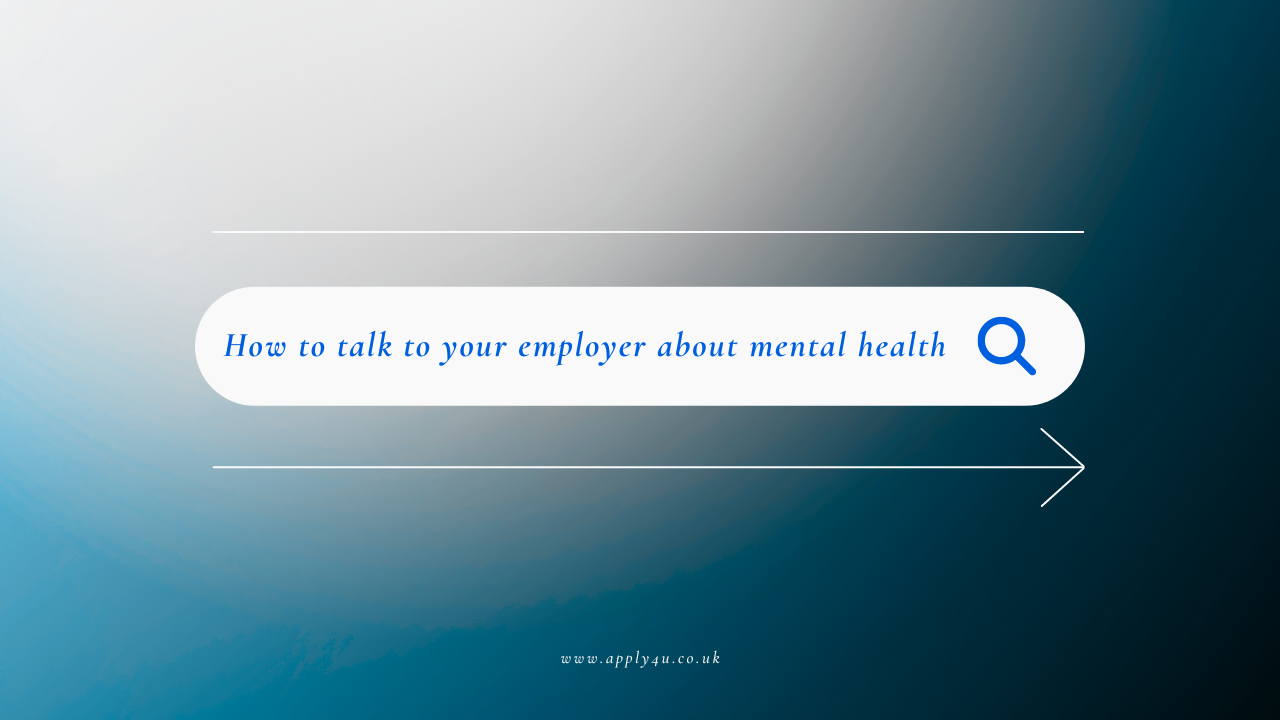Blogs Detail

Talking about Mental Health with your Employer
Posted by: | May 16, 2024

As we observe Mental Health Awareness Week, I want to dive into a crucial yet often challenging topic—how to discuss mental health with your employer. It's vital for your well-being and can significantly impact your career progression.
Understanding Your Rights in the UK
Before you initiate any discussions, it's important to know your rights. In the UK, the Equality Act 2010 protects individuals with mental health conditions considered disabilities. This means your employer is legally required to make reasonable adjustments to help you manage your condition effectively at work. Armed with this knowledge, you can approach the conversation with the assurance that you have a right to support.
Preparing for the Conversation
Self-reflection: Start by clearly understanding what you need. Are flexible hours necessary, or perhaps a quieter workspace? Knowing your needs will help you articulate them clearly.
Documentation: Having documentation from your healthcare provider can strengthen your case. This doesn’t mean sharing your entire medical record, but a note that outlines recommended adjustments can be very helpful.
Plan the Timing: Choose a time when your employer is less likely to be distracted by other duties. Consider scheduling a dedicated meeting to ensure the discussion receives the attention it deserves.
How to Start the Conversation
Choosing the Right Words: You might begin with, "I’ve been managing a health condition, and I believe certain adjustments at work might help me perform better." This approach is professional and focuses the conversation on constructive changes.
Be Honest and Direct: Be transparent about your needs without sharing more personal details than you’re comfortable with.
Focus on Solutions: Discuss how the proposed adjustments can improve your productivity and benefit the team or company, showing that you’re thinking about the mutual advantages of these changes.
Addressing Challenges with Non-responsive Employers
Small Companies or Non-responsive Employers: In environments where there’s no formal HR department or if you anticipate that your employer may not take mental health seriously, the challenge intensifies. In these situations, it's beneficial to talk to friends or colleagues who might have faced similar issues. They can offer personal advice, share strategies that worked for them, and provide moral support which is invaluable.
Seeking External Support: If conversations with your employer don’t lead to any changes, or if you face dismissive attitudes, consider seeking external advice. This could be legal advice from a solicitor specialising in employment law or guidance from local mental health organisations. Additionally, bodies like ACAS (Advisory, Conciliation and Arbitration Service) in the UK offer free, impartial advice on workplace rights, rules, and best practice.
Building a Supportive Environment
Encourage ongoing dialogue about mental health to help create an inclusive and supportive workplace culture. Regular check-ins about the effectiveness of the accommodations and any needed adjustments can foster understanding and continuous improvement.
Conclusion
Initiating a discussion about mental health is about more than addressing immediate needs—it's about transforming workplace culture for everyone. By advocating for yourself, you also pave the way for others.
If you're ready to discuss mental health with your current employer but feel uncertain about how to begin, or if you're seeking a new role with an employer who truly values and supports mental health, remember, you’re not alone. Consider registering with us at Apply4U. We specialise in matching you with companies that prioritise employee well-being and offer environments conducive to managing your mental health effectively. By registering with us, we can help manage your job search, taking care of the details and reducing stress, so you can focus on what really matters—your health and your career progression.
Together, let's break the silence and advocate for a workplace where mental health is openly supported and accommodated!
Powered by Froala Editor
Want to Know More? Contact Us or Explore our Pricing Plans
Search Post
Tags:
Popular Posts
Recent Posts
Categories
- Accountancy
- Administration
- Advertising
- Aerospace
- Agriculture
- Automotive
- Banking
- Catering
- Charity
- Construction
- Consulting
- Customer Services
- Design , Creative & Arts
- Education
- Energy Oil Gas
- Engineering
- Finance
- Health & Safety
- Healthcare
- Hospitality
- HR
- Insurance
- IT
- Legal
- Logistics
- Manufacturing
- Marketing
- Media
- Multilingual
- Pharmaceutical
- PR
- Procurement
- Property
- Public Sector
- Recruitment Consultancy
- Retail
- Sales
- Scientific
- Senior Management
- Social Care
- Sports & Leisure
- Telecommunications
- Transport
- Travel
- Warehouse
Tags
Tags:
